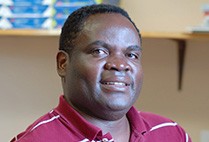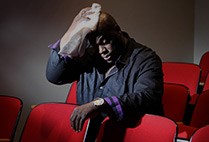Sir Geoffrey Hill’s poetry—often called “allusive” for its esoteric religious, philosophical, and historical references—earned him reverence in the literary community. Nicholas Lezard, a critic for The Guardian, hailed him as “the greatest living poet in the history of the English language” in a 2001 review of Hill’s long poem Speech! Speech! and in a 2013 review of his collection Broken Hierarchies: Poems 1952–2012.
Hill, 84, a University Professor emeritus and a College of Arts & Sciences professor emeritus of literature and religion, died on June 30, 2016, the same day his new translation of Henrik Ibsen’s Peer Gynt was published.
Bruce Redford, a CAS history of art and architecture professor and a director of the University Professors program, which was closed in 2011, says Hill “resembled both Jonathan Swift and W. B. Yeats.” Like Swift, he says, “satire and prophecy, humor and anger, were complexly intertwined in his extraordinary work. That work reached an autumnal flowering during his years at BU—a flowering that resembles, in its vitality and variety, the achievement of Yeats in old age.”
Hill’s work was wide-ranging in form and style, from devotional poetry to prose poetry, from rhyming to free verse. Some critics pointed to a sense of exclusivity to his poetry that resulted from its notorious complexity.
In a 2000 interview with the poet Carl Phillips (GRS’93), a former student, published in the Paris Review, Hill said, “I think art has a right—not an obligation—to be difficult if it wishes. And, since people generally go on from this to talk about elitism versus democracy, I would add that genuinely difficult art is truly democratic.”
In 1999 he cofounded BU’s Editorial Institute with Christopher Ricks, BU’s William M. and Sara B. Warren Professor of the Humanities, whom he knew from his days as a lecturer at the University of Cambridge. “His was the original idea, 20 years ago, for an Editorial Institute to award degrees, doctoral and master’s, in editorial studies,” says Ricks.
Hill was known for his turns of phrases and quick humor in everyday conversation. Ricks says his favorite anecdote is when Hill “was asked how he felt about a critic’s having won a prize for an essay on his work. He said, ‘Ask the horse how he feels when the jockey wins the race.’” Hill published many books of criticism: The Lords of Limit: Essays on Literature and Ideas (1984), The Enemy’s Country: Words, Contexture, and Other Circumstances of Language (1991), Style and Faith (2003), and Collected Critical Writings (2008), which won the Truman Capote Award for Literary Criticism.
He often spoke “in a seriocomic tone that his friends and admirers were prone to call ‘Hillarious,’” says Redford. “In person and on the page, Geoffrey resembled an Old Testament prophet—but, unlike Jeremiah, he allowed himself to be teased, at least on occasion, by lesser mortals.”
Born in Bromsgrove, Worcestershire, England, in 1932, Hill graduated from Oxford University in 1953, where he earned a degree in English and had his first work published by the poet and literary critic Donald Hall. After graduation, he taught at the University of Leeds until 1980, when he completed a yearlong Churchill Scholarship at the University of Bristol. He was then a lecturer at Emmanuel College, Cambridge.
In 1988, he moved to the United States when he accepted a professorship at BU, where he taught for 18 years. His multidisciplinary expertise—he taught courses not only on poetry, but also on 17th-century politics and theology—brought him to the distinguished faculty of UNI, which aimed to “build bridges between disciplines,” and allowed students to create and graduate with interdisciplinary degrees.
During his time at BU, Hill published many poetry collections, among them Canaan (1996), awarded BU’s 1998 Kahn Award; The Triumph of Love (1998), which earned the Ingersoll Foundation T. S. Eliot Award for Creative Writing; and The Orchards of Syon (2002), which was shortlisted for the T. S. Eliot Prize.
In 1996, Hill was elected to the American Academy of Arts & Sciences.
He retired in 2006, and moved back to England. In 2010, he accepted a four-year term as professor of poetry at the University of Oxford, and in 2012 he was knighted for his services to literature.













































Related Stories
Award-Winning Poet New Creative Writing Program Director
Karl Kirchwey hopes to build connections across the University
Former Poet Laureate Pinsky Designs Anthology for Aspiring Poets
CAS prof’s book offers “ways to learn from the poetry of the past”
Poet Crystal Ann Williams First Associate Provost for Diversity and Inclusion
Former Bates College administrator’s goal: to build on BU’s forward momentum
Post Your Comment